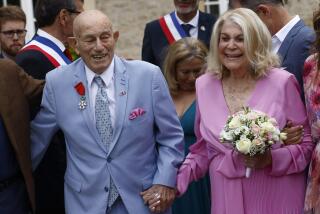COLUMN LEFT : Seeking Peace in a Living War Museum : In Normandy and Brittany, the ghosts of many centuries ask what <i> you </i> would have done.
- Share via
I hadn’t planned on taking a busman’s holiday. Preoccupied with anti-war activity since last August, I felt a deep need to leave the country and put the Gulf War behind me. I thought I was going off to explore the culture and prehistoric megaliths of Normandy and Brittany in western France. Instead, the moral anguish of war followed me across the Atlantic.
I left the United States just before the great military parades and celebrations began in early June. The country seemed infatuated with itself: The war toys and game plans had worked; the enemy crisis had been temporarily solved. Americans seemed satisfied with government censorship and the antiseptic, Nintendo portrayal of war. True, some nagging doubts had surfaced--Iraq’s nuclear arsenal appeared to be intact, the Republican Guard had not been destroyed, the Kurds had been massacred and thousands of Iraqi children were dying from malnutrition. But military success had finally vanquished the Vietnam syndrome. The process of normalization had quietly begun; the pundits demoted Saddam Hussein from Hitler to president of Iraq. The agony and moral anguish that ought to accompany an act of mass killing--yes, even in war--seemed wholly absent from American public culture.
Not so in Europe, where war has left permanent scars on the land and psyches of its people. I had always wanted to see the great medieval Tapestry of Bayeux, somehow forgetting that it is basically a tale of betrayal and war. The length of a football field, this stunningly embroidered linen tapestry vividly recounts William the Conqueror’s crushing defeat of England in 1066. At the end of the exhibit, a short, polite essay--presumably designed to pacify British tourists--notes that there are conflicting interpretations of the event. To the Normans, William the Conqueror’s military success signaled the expansion of a superior culture to the barbarians across the channel. To England, his triumph meant the rape of its women, the death of its children, the destruction of its society. I wondered if such multiple perspectives of a war were acceptable only after 900 years had passed.
On the windy beaches of Normandy, however, I saw no conflicting interpretation, only the horror of fascism writ large. The sheer brilliance and audacity of the Allies’ invasion of Normandy temporarily converted me into a war buff. I wondered how many Americans knew that the British had built and towed an artificial port to Normandy so that the Allies could safely land their tanks and Jeeps. At Omaha Beach, I stood atop the daunting cliffs from which bunkered Nazis fought off American soldiers charging ashore. Nearby, at the American cemetery, the sun cast harsh shadows on the endless rows of white crosses under which thousands of American soldiers are buried. No moral ambiguity here; just melancholy at the enormity of loss.
In the small village of Malestroit, the Museum of the Breton Resistance confronted me with the moral ambiguities that touched daily life during World War II. Each act of sabotage or assassination attempt against the Nazi occupying forces in Brittany brought reprisals against dozens or hundreds of ordinary citizens. In a perfectly re-created Breton village square, a photographic mural depicts the Nazis’ execution of a suspected resistance fighter. A simple basket filled with fruit, the camouflage that local women used for smuggling resistance information, reminded me of the consequences these tough villagers faced: capture by the Nazis, the agony of having ignited reprisals against neighbors, the shame of doing nothing at all.
Weeks of holiday spent brooding over war provided no new answers, only questions to be confronted in fear and trembling: What constitutes a just war? How and when can a society accept multiple interpretations of a war? For what would I sacrifice my life?
Unlike Americans, Europeans cannot forget the blood-soaked reality of war. The American celebratory mood seems adolescent, even craven, in comparison. The country doth protest too much.
Some say that my obsession with seeking alternative resolutions to aggression and conflict is hopelessly naive. I remind them that slavery was once a perfectly legal and socially acceptable institution. Upon my return, however, it is not my own preoccupation with the moral ambiguities of war that worries me but the soul of a nation that regards war with childlike delight.
More to Read
The biggest entertainment stories
Get our big stories about Hollywood, film, television, music, arts, culture and more right in your inbox as soon as they publish.
You may occasionally receive promotional content from the Los Angeles Times.










